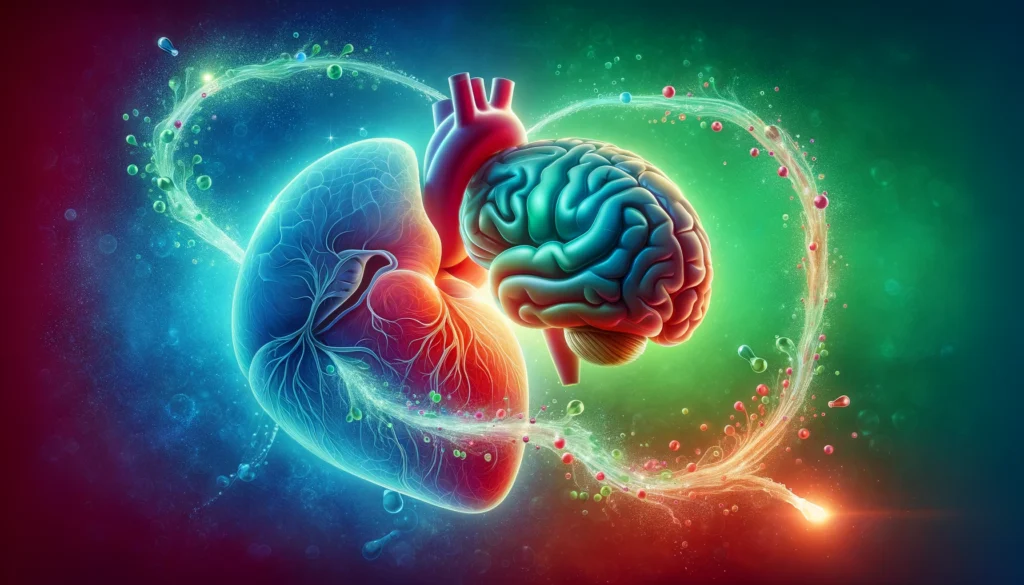
Prefer to listen?
💨 Breathe Life Into Your Health: Oxygenation, Heart, and Brain Wellness 🌟
In the intricate tapestry of our body’s systems, oxygen plays a critical role, linking our heart’s health to our cognitive abilities. Oxygenation, the process of delivering oxygen to our tissues and organs, is fundamental to our overall well-being. Mindful Diabetes Inc., through its “Pathways to Wellness” series, delves into how maintaining optimal oxygen levels can bolster heart health and, in turn, preserve cognitive function.
The connection between heart health and brain health is profound. As research continues to uncover the complexities of this relationship, it becomes clear that taking care of our cardiovascular system has far-reaching benefits for our mental acuity and overall brain health. In this blog, we explore how oxygenation influences heart health, and how this relationship impacts cognitive decline.
Join us as we navigate the essential pathways that link oxygenation to heart health and cognitive function, guided by the insights from Mindful Diabetes Inc.’s “Pathways to Wellness” series. Discover practical advice and recent research findings that can help you enhance both your physical and mental health.
❤️ Join Us in Preventing Type 3 Diabetes
Your gift supports scientifically backed prevention programs, cognitive-health education, and AI tools that help families reduce the risk of Alzheimer’s-like symptoms linked to diabetes.
Mindful Diabetes Inc. is a 501(c)(3) nonprofit — all donations are fully tax-deductible.
The Role of Oxygenation in Heart Health
Understanding Oxygenation
- Definition and Importance: Oxygenation refers to the process by which oxygen is transported from the lungs to the bloodstream, and subsequently to various tissues and organs.
- Mechanism: This process is facilitated by the respiratory and circulatory systems working in harmony. Oxygen binds to hemoglobin in red blood cells, which then travel through the bloodstream to deliver oxygen throughout the body.
- Indicators of Proper Oxygenation: Healthy oxygen levels are typically measured using oxygen saturation (SpO2) levels, with normal readings ranging from 95% to 100%.
Impact on the Heart
- Oxygen and Cardiac Function: The heart, a muscle that never rests, requires a constant supply of oxygen to function efficiently. Adequate oxygenation ensures that the heart muscles receive enough oxygen to pump blood effectively.
- Consequences of Poor Oxygenation: When oxygen levels drop, the heart has to work harder to pump blood, leading to increased stress on the cardiovascular system. This can result in conditions such as angina, arrhythmias, and even heart failure.
- Research Insights: Studies have shown that chronic hypoxia (low oxygen levels) can lead to significant cardiovascular issues, including hypertrophy (thickening of the heart muscle) and reduced heart function.
Enhancing Oxygenation for Heart Health
- Breathing Techniques: Practicing deep breathing exercises, such as diaphragmatic breathing, can enhance lung capacity and improve oxygenation.
- Regular Exercise: Engaging in aerobic activities like walking, running, and swimming can boost cardiovascular health and promote better oxygen delivery throughout the body.
- Healthy Diet: Consuming a balanced diet rich in antioxidants can improve overall cardiovascular health, facilitating better oxygenation.
🌟 Try Our Free Wellness Tools!
Set the high score in our Mindful Eating Game, explore JEIR, or dive deeper into the science behind our AI-driven prevention tools!
🤖 Try JEIR — Your AI Wellness Guide 🎮 Play the Mindful Eating Game 📘 Read About the Mindful Eating Game 🤖📘 Read About the AI Behind JEIRHeart Health and Cognitive Decline
The Cardiovascular-Cognitive Connection
- Blood Flow to the Brain: The brain relies heavily on a steady supply of oxygen-rich blood. The heart’s ability to pump blood efficiently directly affects cerebral blood flow.
- Vascular Health and Cognition: Healthy blood vessels ensure proper delivery of oxygen and nutrients to the brain. Poor vascular health can lead to reduced cognitive function and an increased risk of conditions like dementia and Alzheimer’s disease.
- Scientific Findings: Research indicates that individuals with cardiovascular diseases are at a higher risk of experiencing cognitive decline. Conditions like hypertension and atherosclerosis can impair blood flow to the brain, affecting cognitive abilities.
Risk Factors and Prevention
- Shared Risk Factors: Factors such as high blood pressure, high cholesterol, and diabetes are common to both cardiovascular diseases and cognitive decline. Managing these risk factors can benefit both heart and brain health.
- Preventive Measures: Regular monitoring of blood pressure and cholesterol levels, maintaining a healthy weight, and avoiding smoking are crucial steps in preventing both cardiovascular and cognitive issues.
- Recent Studies: A study published in the Journal of the American Heart Association highlights the importance of managing cardiovascular risk factors to reduce the incidence of cognitive decline and dementia.
Lifestyle Interventions
- Physical Activity: Regular exercise not only strengthens the heart but also promotes brain health by enhancing blood flow and reducing inflammation.
- Mental Stimulation: Engaging in mentally stimulating activities such as reading, puzzles, and learning new skills can help maintain cognitive function.
- Healthy Diet: A diet rich in fruits, vegetables, whole grains, and lean proteins supports both cardiovascular and cognitive health.
Oxygen and Cognitive Health
Oxygen’s Role in Brain Function
The brain, though only 2% of body weight, consumes 20% of the body’s oxygen.
- Neurons require a constant oxygen supply to generate energy for neurotransmission.
- Oxygen is vital for the synthesis of neurotransmitters like dopamine and serotonin, crucial for mood regulation and cognitive functions.
- Cerebral blood flow, ensuring adequate oxygen delivery, is essential for memory formation and information processing.
- Oxygen deficiency can impair cognitive functions, leading to symptoms like confusion, poor concentration, and memory loss.
Cognitive Decline and Poor Oxygenation
Insufficient oxygenation is linked to various forms of cognitive decline.
- Chronic hypoxia can contribute to neurodegenerative diseases like Alzheimer’s and Parkinson’s.
- Sleep disorders, such as sleep apnea, cause intermittent hypoxia, affecting cognitive abilities and increasing dementia risk.
- Studies have shown that individuals with chronic lung diseases have a higher incidence of cognitive impairment.
- Hypoxia-induced oxidative stress can damage brain cells, accelerating cognitive decline.
Strategies to Improve Oxygenation for Better Cognitive Health
Enhancing oxygenation can protect and improve cognitive functions.
- Regular physical exercise boosts brain oxygen levels and promotes neurogenesis (creation of new neurons).
- Cognitive activities like puzzles, reading, and learning new skills stimulate brain activity and oxygen demand.
- Ensuring good sleep quality and managing sleep apnea can improve night-time oxygenation and cognitive health.
- A diet rich in omega-3 fatty acids, antioxidants, and vitamins supports brain health and efficient oxygen utilization.
Conclusion
Key Takeaways on Oxygenation and Health
Oxygen is a vital component for both heart and cognitive health.
- Adequate oxygenation supports the heart’s ability to function efficiently and reduces the risk of cardiovascular diseases.
- The brain relies on a steady supply of oxygen to maintain cognitive functions and prevent decline.
- Lifestyle choices, including regular exercise, a balanced diet, and good sleep hygiene, are crucial for optimal oxygenation.
Pathways to Wellness: Actionable Steps
Mindful Diabetes Inc. encourages proactive measures to enhance oxygenation and overall health.
- Incorporate daily aerobic exercises and deep breathing practices to improve oxygen intake.
- Monitor and manage any respiratory conditions to ensure sufficient oxygen levels.
- Engage in mentally stimulating activities and maintain a brain-healthy diet.
- Avoid smoking and reduce exposure to environmental pollutants to support respiratory and cardiovascular health.
Mindful Diabetes Inc.’s “Pathways to Wellness” series is dedicated to providing valuable insights and practical advice for a healthier, more vibrant life. By understanding the crucial role of oxygenation, we can make informed choices that benefit both our hearts and minds.
📖 Continue Exploring 🌐
Don’t stop here! Dive deeper into the fascinating connection between mental wellness and physical health in our upcoming blogs. There’s always more to discover and explore.
💌 Stay Informed and Inspired 📬
Subscribe to our newsletter for the latest insights, tips, and updates on the mindful path to better health. Together, we’ll continue to unlock the secrets of a balanced and vibrant life.
Thank you for your continued support and readership. Here’s to a healthier, happier you! 🌈💚




